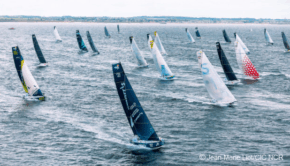Don’t change universal rescue command
Published on September 26th, 2025
by Craig Warner
The word is out that modern politics are attempting to influence the changing sailing’s most crucial emergency communication command, ‘MAN OVERBOARD’. To change the words of this command will not result in additional successful rescues. The opposite is true.
When it comes to training or initiating an emergency procedure, it is essential to establish a well-understood line of communication. Commands using standard phraseology that are clearly understood by those responding to the emergency are imperative. I was a military and commercial pilot for some 44 years. There is no other profession that trains to the level of safety as that of an aircrew.
Emergency procedures are ingrained in you, and the importance of standard phraseology is a must in executing the correct and timely procedure. In the B-52, if all else failed and the aircraft was going to crash, the aircraft commander would issue the command “Eject”.
Each crew member sits in an ejection seat that explosively propels the occupant out of the aircraft hitting an airstream of hundreds of miles per hour, either at 200 feet above ground or 40,000 feet in the air. Survival of the aircrew member depended on clearly understanding the command and initiating the ejection emergency procedure, “ARMING LEVERS ROTATE, TRIGGERS SQUEEZE”. Your life depended on the training you received and your ability to understand and execute the emergency procedure immediately!
Just as air crew members practice critical safety procedures, I have endeavored to adopt the same successful safety training into the sport of sailboat racing. As someone who has raced sailboats for over 40 years, it is clear to me that sailors need standardized safety training. Sailboat racing has its most feared emergency, and that is a ‘MAN OVERBOARD’.
Upon noticing a missing crewmember, much like the B-52 Aircraft Commander commanding eject, the term used in sailing is MAN OVERBOARD! This command is clearly understood by all. Upon hearing the command, it should put into motion the ‘MAN OVERBOARD’ emergency procedure that you and your crew have practiced extensively.
A human body in water is in a dangerous environment. The faster you effect the rescue, the better chances the victim has of surviving. There is a need for a standardized command that is clearly understood by all, whether it is your crew or others willing to assist. Phraseology that is unclear and leaves doubt will not aid in the rescue of a crew member who has departed the boat in an unplanned manner. Phraseology clearly understood will instantly put a practiced rescue plan into motion.
I understand that some take offense at the command ‘MAN OVERBOARD’ and want to change it. Inventing your own phraseology will diminish the safety culture associated with this emergency. There is no room for everyone to have their own command.
The command ‘MAN OVERBOARD’ is universal and has led to numerous successful rescues since the 1500s. It galvanizes all mariners to summon their resolve, skill, and courage to rescue a fellow mariner in distress regardless of any skin color, political affiliation, sex, etc. When you are plucked from the water and near death, you will not only thank those who saved your life you will also be grateful for the time honored command that is only concerned with saving lives, “Man Overboard.”
Let’s be careful out there.









 We’ll keep your information safe.
We’ll keep your information safe.